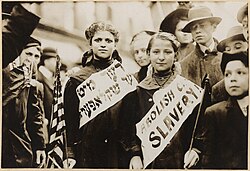
The International Day for the Abolition of Slavery [1] is a yearly event on December 2, organized since 1986 by the United Nations General Assembly.
Contents
The Convention for the Suppression of the Traffic in Persons and of the Exploitation of the Prostitution of Others [2] was approved by the United Nations General Assembly [3] on December 2, 1949. Besides, by resolution 57/195 of 18 December 2002, the Assembly proclaimed 2004 the International Year to Commemorate the Struggle against Slavery and its Abolition.
Activities on this day include publishing articles, poetry, and opinion pieces to provoke thought and discussion, classroom reviews of the history of the slave trade and its modern evolutions, and public speeches by political leaders urging action to eradicate slavery. Media outlets often feature news, debates, and forums to further highlight the issue, while public awareness campaigns distribute informational materials in universities and community spaces. [4] [5]